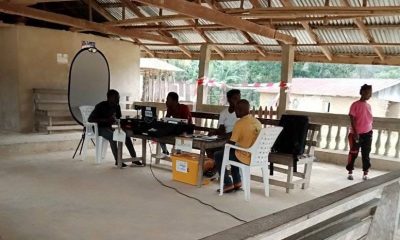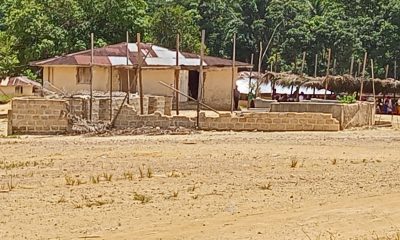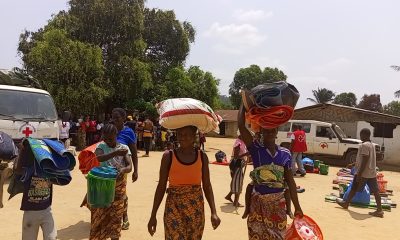Gbbarpolu County – Health care delivery in Liberia was weakened by the EVD outbreak in 2014, exposing major gaps and for now, the health system is being reform by the government and its partners with collaboration from communities to ensure the implementation of a 10 year government investment plan aim at making Liberia’s health sector resilient.
However, health workers in Gbarpolu County are still concern about limited lodging facilities for them in the county. Health workers are lodge in buildings own by local chiefs which are they say ‘are not even up to local standard’.
Speaking to LocalVoicesLiberia reporter in Gbarpolu, Maude K. Kerkula, a Registered Midwife assigned at the Bambuma Town clinic in Bopolu health district said, upon taking assignment at various facilities in rural areas, they were accommodated by town chiefs for more than two months and were left to fetch dwelling places for themselves.
“We ourselves can look for place to stop and now the place I am stopping is a death trap for me,” she said. “As a result I can only come here to eat and go back and sleep [in] the delivery room at the clinic.”
Maude has worked for Gbarpolu County health team for six years, dedicating her service to saving lives but she’s now seeking a better lodging facility and complained that promises by the community to recondition the building are all to no avail.
Gbaryama Clinic’s OIC, Elizabeth Samukai, complains that community dwellers are showing little support for health workers in their area, adding that some nurses assigned at the clinic are struggling for accommodation.
“This poses serious challenge to encouraging health workers in rural areas and also affects their income monthly and this is unbearable,” Samukai said.
Some health workers are now lodging at the county’s administration building where the district commissioner administers the affairs of Gbarma district. And health workers say since the building is used as venue for public meetings and workshops, it is not favorable to be used as residence for them.
Pathway to Resilient Health Plan
The County Health Officer, Dr. Anthony Tucker, has reassured commitment to implementing national government’s investment plans which aim at improving the health services for Liberians.https://localvoicesliberia.wordpress.com/wp-admin/post-new.php
Dr. Tucker said by implementing the resilient health plan it will enhance the management and strengthening of the health sector and ensure the workforce efficiently provide quality services that are equitable and accessible for all.
The CHO said they are currently carrying out projects intended to attract health workers to the rural health facilities by providing Infrastructure designed to suit the health workforce.
“We are constructing six staff quarters because you have people who come from various areas to work in the county and they go to various community and rent or [are] living in a structure that are not too conducive for them,” Dr. Tucker said. “The staff quarter is a community project, we are just supporting them and the community people are committed to the construction works.
He disclosed that two of the staff quarters are located in Gbarma District, two in Belle, two in Bopolu and one in Guo-nwolalai District. “By December, we hope to dedicate these buildings to help ease some of the difficulties nurse face in those areas”, he said.
He named road network as a major challenges to the supply chain but assure the people of Gbarpolu that with their integration the project will be successful on time.
Bopolu Commissioner, Olu Nangba, said the project has been welcomed by the community, despite frequent complaints from health workers about how they are being treated by these locals.
Hon. Nangba said the communities are providing local materials including crash rocks, sand, land and manpower. He also disclosed that some of the staffs in Henry Town clinic are ranting.
According to him, “the money they (nurses) are making is nothing”. He said citizens of the county in those project communities will work hard for “these projects to be completed within the required time”.
The community health development committee chairman (CHDC) Bammu P. Zinnah, said the community has always wish for taking the lead to build homes the nurses. He said during the process of getting his people support, they were informed by the CHT to build nurses quarters and needed local support.
He describes the project as “timely and a dream come true” while calling for the total involvement of the community people and complained about the deplorable condition of the building that is hosting some nurses in the county.
He thanked the government for the health investment plan and asked the people of the clinic catchment communities to support the project to its completion.
Apart from the nurses’ quarters under construction, Gbarpolu’s health infrastructure includes 15 government’s owned clinics, one private and one hospital. These health facilities render health care services to over 97,600 people of the county
The Fifteen (15) facilities are supported through a pool fund along the referral hospital which is located in Bopolu City.
Report By; Henry Gboluma
Editor’s Note: This story was previously published by FrontPage Africa newspaper.


Methodology

True
The claim is rigorous and the content is demonstrably true.

Half True
The statement is correct, although it needs clarification additional information or context.

Unproven
Evidence publicly available neither proves nor disproves the claim. More research is needed.

Misleading
The statement contains correct data, but ignores very important elements or is mixed with incorrect data giving a different, inaccurate or false impression.

False
The claim is inaccurate according to the best evidence publicly available at this time.

Retraction
Upon further investigation of the claim, a different conclusion was determined leading to the removal of the initial determination.

Toxic
A rude, disrespectful, or unreasonable comment that is somewhat likely to make you leave a discussion or give up on sharing your perspective. Based on algorithmic detection of issues around toxicity, obscenity, threats, insults, and hate speech;
































































































































































































































































































































































































































































































































































































